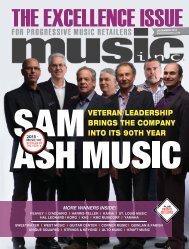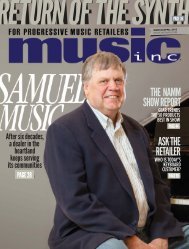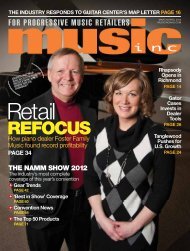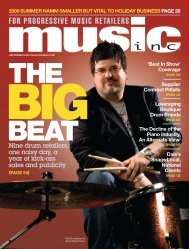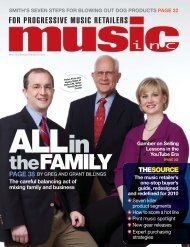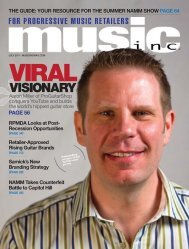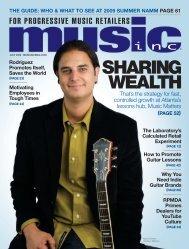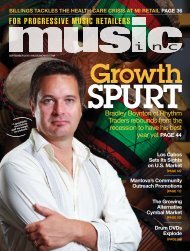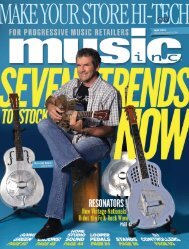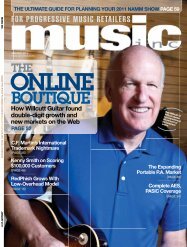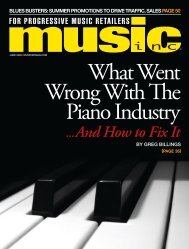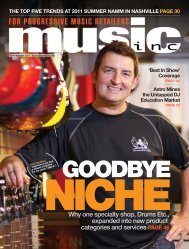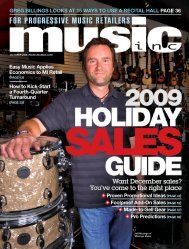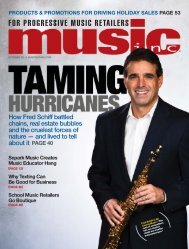You also want an ePaper? Increase the reach of your titles
YUMPU automatically turns print PDFs into web optimized ePapers that Google loves.
{MUSICADVOCACY}<br />
INSULATE PROGRAMS<br />
DENNY SENSENEY FORMER OWNER OF SENSENEY MUSIC WICHITA, KAN.<br />
Learning to make<br />
your own music is a<br />
blessing the music<br />
products industry<br />
and music education<br />
profession enjoy, one universally<br />
accepted to have a<br />
positive impact on our lives.<br />
Why then do we consistently<br />
find ourselves in the position<br />
of defending school music programs<br />
in front of legislators<br />
and school board members?<br />
I believe it’s because we<br />
have been largely ineffective at<br />
applying insulation to our<br />
product. Insulation eliminates<br />
or slows down unwanted side<br />
effects. Electric wires have<br />
insulation, our homes have<br />
more insulation than ever<br />
before, and our businesses<br />
have insulation (i.e. insurance)<br />
to ward off the effects of accidents<br />
or a lack of imagination.<br />
Becoming an effective advocate<br />
for music education in the<br />
public schools can slow the<br />
danger created by budget cuts<br />
or schedule restrictions. And<br />
developing a corporate advocacy<br />
strategy is good business<br />
that’s also good for students,<br />
schools and communities.<br />
Customers are attracted to<br />
businesses that help improve<br />
their communities, regions<br />
and states. Quality employees<br />
are attracted to and stay with<br />
companies that are responsible<br />
leaders in their fields. Not<br />
least of all, decision makers<br />
respect such businesses.<br />
CORE BELIEFS<br />
Where can you start as an<br />
advocate? Articulate<br />
what you believe in. I developed<br />
54 I MUSIC INC. I OCTOBER 2010<br />
‘The extent<br />
to which our<br />
message is<br />
sound, welldocumented<br />
and, most of<br />
all, reasonably<br />
presented will<br />
determine the<br />
outcome.’<br />
two strong beliefs over 40 years<br />
serving the music profession in<br />
our community and region:<br />
1. Without strong music programs<br />
in the public schools, a<br />
cultural caste system will<br />
develop where only wealthy children<br />
will have access to an education<br />
enriched by the arts.<br />
Market expansion cannot exist<br />
in this kind of environment,<br />
and moreover, it is not the<br />
right thing to do.<br />
2. We must develop both a<br />
“wellness program” and an<br />
“emergency room.” A wellness<br />
program educates decision<br />
makers about the wisdom of<br />
creating and maintaining<br />
strong music programs at the<br />
core of the curriculum. An<br />
emergency room is necessary<br />
to save programs threatened by<br />
the ignorance of fast-acting,<br />
well-intentioned decision makers<br />
under pressure of budget<br />
and schedule challenges.<br />
THE FIGHT IN WICHITA<br />
In the 1980s, the Wichita<br />
Board of Education recommended<br />
elimination of music<br />
and art from all elementary<br />
schools in response to budget<br />
restrictions of that recessionary<br />
period. Perceiving this as<br />
both bad for business and bad<br />
for thousands of students, I<br />
called a meeting in my office<br />
of community leaders from the<br />
fields of education, business,<br />
politics and arts organizations<br />
to discuss the situation and<br />
present a plan to address the<br />
proposal.<br />
Using the NAMM advocacy<br />
Guidebook created by Karl<br />
Bruhn — a retired music<br />
industry executive and former<br />
NAMM director of market<br />
development — a group of passionate<br />
advocates were empowered<br />
to make a difference.<br />
They set up and activated a<br />
communication tree with<br />
information on how to be an<br />
effective advocate.<br />
Thousands of messages<br />
were delivered by mail, fax and<br />
phone, as well as in-person, to<br />
board of education members<br />
and school administrators in<br />
support of maintaining the<br />
existing music and art programs<br />
at current levels. The<br />
passion and volume of the<br />
debate effected a reversal of<br />
the proposed action.<br />
OUR OBLIGATION<br />
Sadly, that was not the last<br />
attempt to cut music programs<br />
in ensuing years. The<br />
primary catalyst has always<br />
been either budgetary concerns<br />
or scheduling challenges<br />
resulting from No Child Left<br />
Behind legislation.<br />
I believe most educational<br />
decision makers — administrators,<br />
board of education<br />
members and legislators —<br />
support strong schools for our<br />
children and our communities.<br />
They have a very difficult job<br />
allocating dollars and time for<br />
the best outcome for the most<br />
students.<br />
The voice of music education<br />
advocates is now one of<br />
many heard by decision makers.<br />
The extent to which our<br />
message is sound, well-documented<br />
and, most of all, reasonably<br />
presented will determine<br />
the outcome. It is the obligation<br />
of community members, taxpayers,<br />
parents and students to<br />
articulate effectively and with<br />
integrity the kind of education<br />
they desire.<br />
It is also the obligation of<br />
those of us who believe in the<br />
power of music education to<br />
share our understanding and<br />
passion with those who have<br />
accepted the responsibility of<br />
making decisions for us. MI



